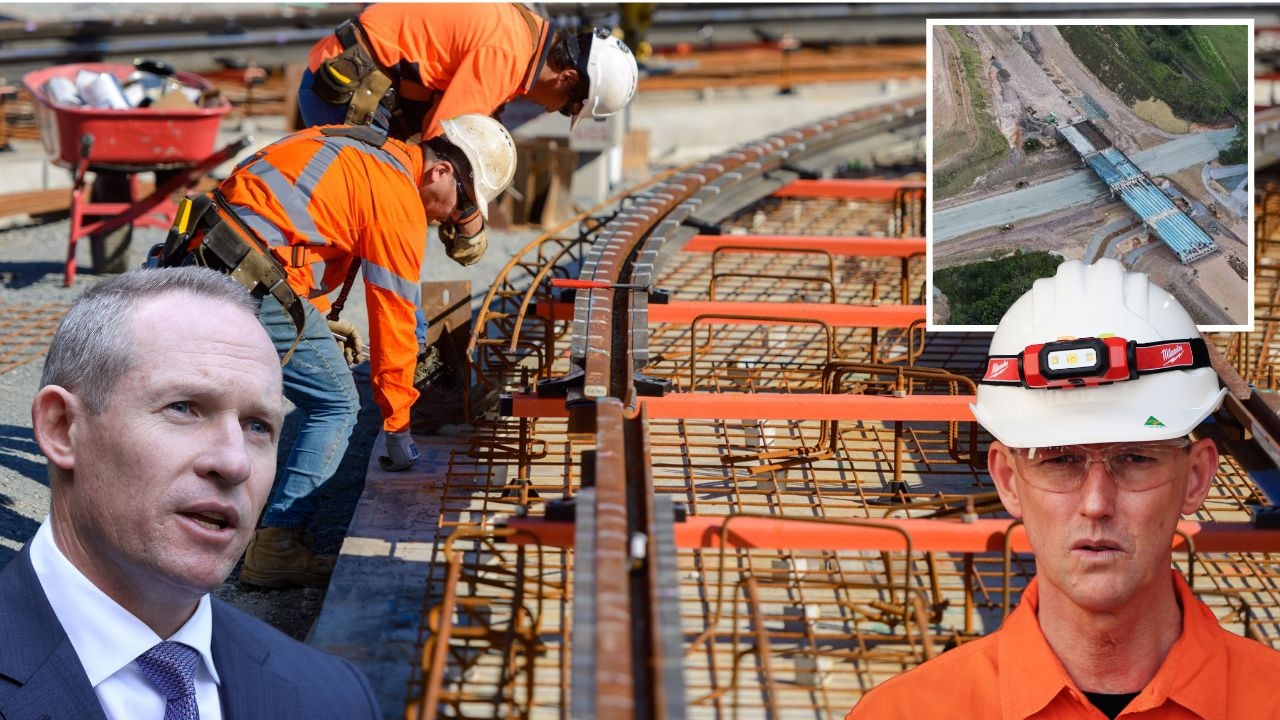Construction Qld: Insiders claim costs up, productivity down as a result of ‘CFMEU tax’ govt policy
Cost blowouts, massive delays, extraordinary salaries – this is the “CFMEU tax” which construction insiders say is costing Qld taxpayers millions of dollars.

QLD News
Don't miss out on the headlines from QLD News. Followed categories will be added to My News.
Queensland’s multibillion-dollar construction pipeline is at risk of further blowouts and lengthy delays due to a state government policy industry insiders claim has artificially driven up wages and slashed productivity.
Whistleblowers have claimed multi-millions of taxpayer dollars are being wasted due to the government’s Best Practice Industry Conditions policy – which forces contractors and unions to negotiate agreements on state civil construction projects worth more than $100m – pointing the blame at Public Works and Procurement Minister Mick de Brenni.
Under the union-centric conditions – dubbed the “CFMEU tax” – the industry warns state-funded projects were being driven up as much as 30 per cent, with traffic controllers and labourers paid up to $200,000 on some sites.
Transport Minister Mark Bailey has also copped flack over his support of the policy, with major transport projects including the Coomera Connector, Gold Coast Light Rail and the Rockhampton Ring Road all impacted.
Multiple high-ranking industry insiders have told The Sunday Mail the policy was akin to the state government “interfering in the free market”, that it had crippled productivity and was having “gobsmacking ramifications” for smaller projects and subcontractors.
“We’re seeing our state government operating in spaces where they legitimately shouldn’t be,” one said, asking for anonymity due to potential backlash from the unions and the state government. “This is not value for money – it’s the opposite. We are very happy to pay our workers good wages, but these deals are so bad for productivity we are paying much more, for less.”
Another top insider said it would be disingenuous to blame all cost increases on state government projects on BPICs, but it was a case of the “state government interfering in the free market”.
“A big issue is on those major projects, $300m plus, because for every $100m added there’s an extra increase, about $5 to $7 per hour,” he said.
“That’s the reason why a project such as the Coomera Connector (about $600m more than first budgeted) will be under more cost pressure than what the economic conditions would have otherwise caused.”
The policy pushes contractors to the bargaining table with unions who had previously had little impact in the civil construction space – such as the CFMEU – who the industry fears is pushing to become the dominant union above the longstanding AWU.
“It’s clearly a push from inside cabinet of certain ministers giving the unions a leg up,” an insider said.

But the CFMEU pushed back, saying the alternative to BPICs was a “Hunger Games-style race to the bottom resulting in poor build quality, unsafe work practices and exploitation of workers”.
“It is pretty bloody rich for the executives of major private sector companies to whine about “competition” for a finite pool of labour,” a spokesman said.
“Is that not how ‘free enterprise’ and open markets are supposed to work?
“Find me this mythical traffic controller earning $200k a year. Yes, construction workers can earn good money. If you’re working 50-60 hours a week in an itinerant and intermittent industry and pulling weekend and night shifts in a dangerous job you deserve to be paid properly.”
Insiders said the claim BPICs were limited to the largest projects was “bull”.
“You cannot limit its effect to only projects over $100m, you’ve redirected the market to have to compete with those forces to attract labour – so the state government has moved the whole industry,” one said. “They’ve trampled the award – you cannot blame any worker for leaving a council job to earn twice as much on a BPIC job.”
Civil Contractors Federation Queensland chief Damian Long said “we have always said it is a bad policy”.
“I’ve never seen a situation where the client is involved in the enterprise bargaining,” he said.
“The state has stepped in and is doing the bidding on the behalf of the union – which is just bizarre.”
But Mr de Brenni backed the policy, and said “quality conditions are crucial to attracting quality tradies during what is nationally recognised as an ongoing infrastructure workforce shortage”. “Queenslanders expect their schools and hospitals to be built to the highest standards – by workers who are well-trained, fairly compensated, and safe while on the job,” he said.
Mr de Brenni did not answer questions about what the average cost implication of a BPIC was on a state-funded project.
Originally published as Construction Qld: Insiders claim costs up, productivity down as a result of ‘CFMEU tax’ govt policy






